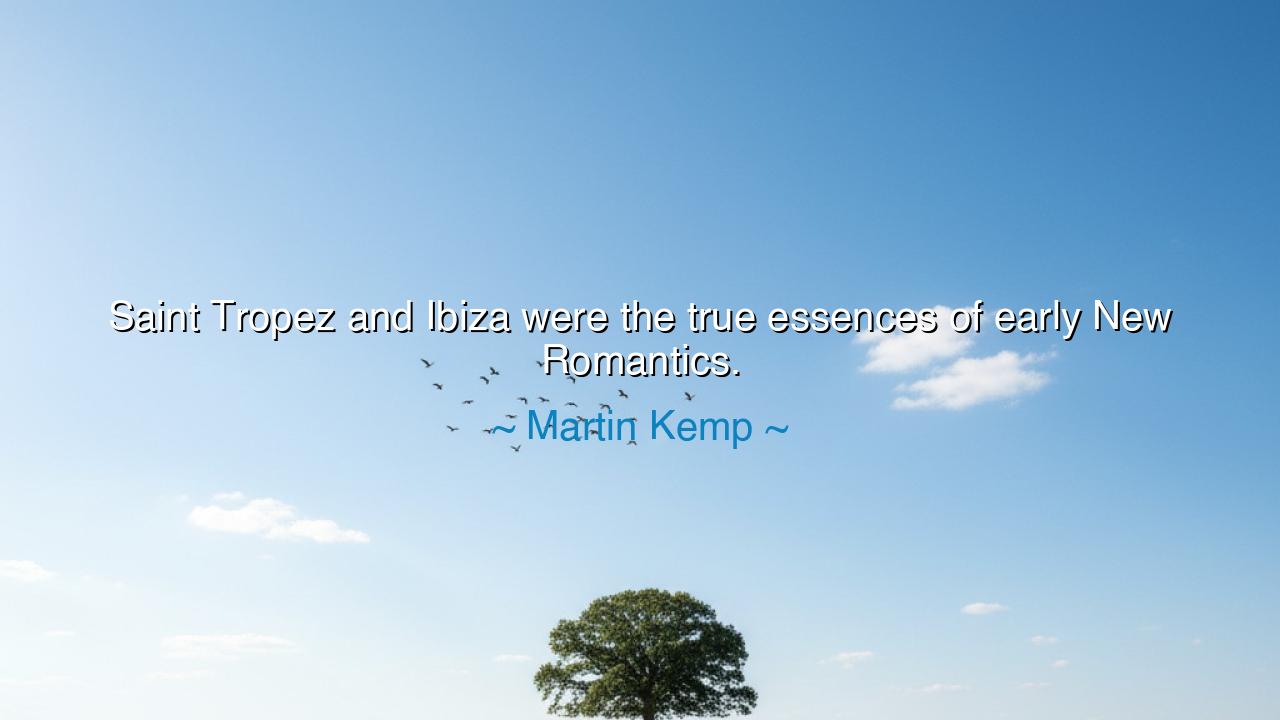
Saint Tropez and Ibiza were the true essences of early New






“Saint Tropez and Ibiza were the true essences of early New Romantics.” Thus spoke Martin Kemp, whose life was entwined with the very heartbeat of that movement. In this phrase, he evokes not only the glittering geography of two places but the soul of an age that sought to redefine beauty, style, and identity. His words remind us that there are times in history when entire generations look for sanctuaries, places where freedom of spirit can flourish, where art, music, and desire intertwine into something greater than survival—a vision of living as performance, and performance as living.
The New Romantics, born in the shadows of the late 1970s and early 1980s, were not warriors of empire or monks of the cloister. They were artists, musicians, and dreamers who sought to escape the greyness of post-industrial Britain, to transform their lives into theater. They clothed themselves in silk, lace, makeup, and extravagance; they sang not of bare survival but of heightened existence. In their search for freedom, they found in Saint Tropez and Ibiza their temples—lands where sunlight, sea, and nightclubs created the stage for new forms of beauty.
Saint Tropez, long a refuge for painters, poets, and wanderers, had already been sanctified by the presence of Brigitte Bardot, Picasso, and bohemian seekers. To step upon its golden shores was to step into a myth of sensual freedom, a place where convention dissolved beneath the Mediterranean light. Ibiza, meanwhile, was the island of eternal night, where music pulsed like the heartbeat of Dionysus himself, where the dancer and the dreamer merged until dawn. Together, these places embodied the essence Kemp describes: they were more than locations—they were symbols of liberation, indulgence, and the rebirth of style as rebellion.
The ancients, too, knew the importance of sacred places where identity was transformed. The Greeks had their Delphi, where the oracle breathed divine truth; the Romans had their Bacchic rites, where citizens became for a night not senators or peasants, but children of ecstasy. In much the same way, Saint Tropez and Ibiza were the sanctuaries of the New Romantics. They were modern temples where the ordinary world fell away, and youth could imagine themselves as gods and heroes of beauty.
History shows that such movements are not trivial but vital. Consider the salons of Paris in the 18th century, where philosophers and artists met to dream of new worlds. Out of these gatherings came revolutions of thought and action. So too, in the clubs of Ibiza and on the beaches of Saint Tropez, the New Romantics dreamed—not of overthrowing kings, but of overthrowing dullness, conformity, and despair. Their revolution was not political but aesthetic: the insistence that life itself could be art, that to dress, dance, and sing was to rebel against the grey machinery of the modern age.
The lesson for us is clear: we all need our Saint Tropez and Ibiza, whether literal or symbolic. We need spaces where we can shed the weight of convention, where we can dream more boldly, create more freely, and live with heightened awareness of beauty. These places need not always be coastal paradises—they may be a studio, a circle of friends, a moment of song at midnight. But without them, life becomes mere endurance. With them, life becomes a tapestry of wonder.
Practical action flows naturally: seek your sanctuary of expression. Do not be afraid of beauty, of extravagance, of joy. Find places where your spirit can rise above the ordinary, where your imagination can breathe. And do not dismiss such pursuits as frivolous—for they are the very fabric of culture, the pulse that reminds us we are not only workers and survivors, but creators, lovers, and dreamers.
So, children of tomorrow, remember Martin Kemp’s words. The essence of the New Romantics was not only in their music or clothes, but in their sacred spaces—Saint Tropez and Ibiza—where spirit was freed to dance. Find your own such places, and let them remind you that life, in its truest form, is not only endured, but celebrated with style, passion, and endless imagination.






AAdministratorAdministrator
Welcome, honored guests. Please leave a comment, we will respond soon